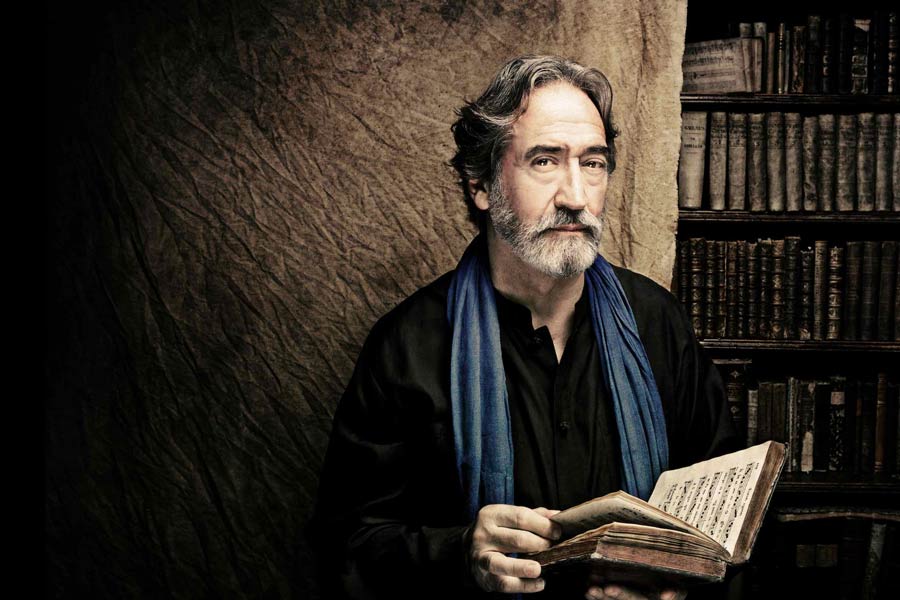When musicians meet, they play and listen to each other. They also make attempts at playing with each other. And when they come home, they are full of new melodies, new songs. The more frequent, more intense the contacts, the easier it is for ideas to spread, blend into local traditions, assimilate with different cultures.
In order for such contacts to occur, there must be trade routes. In the days before railway, the sea was the road. The ocean has always been considered an almost insurmountable barrier: a border, yet not an obstacle. A peculiar area, mixing a variety of cultural and civilization influences, were the lands bordering the Mediterranean Sea, the body of water that washes the shores of three continents.
To work on his project Orient – Occident Jordi Savall invited musicians from Mediterranean countries, representing the musical traditions of the three great monotheistic religions: Judaism, Christianity and Islam. They brought with them their customs and their instruments. Together they perform compositions ranging from the thirteenth to the eighteenth century. The wealth of this melting pot of cultures is stunning, and so is the intensity with which its musical ideas have penetrated each other. We will hear the music of thirteenth-century Spain, the Italian Trecento, compositions originating in Cyprus, Morocco, Syria and France. In the project, Sephardic tradition resonates with the Arabic; Persian traditions mixes with Christian. Difference does not create dissonance.
The first version of this program was created by Jordi Savall in 2001. To this day, Orient – Occident has been presented in many variations as a manifestation of the dream shared by the Catalan master, who sees the world as a place in which nations, civilizations and religions coexist in peace. Savall believes that music is the most appropriate way to express this desire, a way that works better than words, stronger than intellectual debate.
The music of three great religions of the Mediterranean in concert aims to initiate a dialogue, a spiritual understanding between East and West. One might say: this is an utopian vision. But perhaps an utopia is what we now need most.

Invocation: Danse du vent (Syria)
Kamti Beivshan Layla from Song of Songs (Israel)
La guarte estampie royal from Le manuscrit du roy (France, Paris)
In Damas (Syria)
El rey Nimrod – Sephardic tradition (Spain)
Dillirga / Tillirkotissa – Turkish and Greek song and dance (Cyprus)
Ce Brun Hal asmar (Syria, Damascus)
Der makām-ı Uzzäl Sakîl „Turna” Semâ’î – Mss. D. Cantemir, 324 ( Romania)
Asher Mizrahi La Moledet shuvi roni (Izrael, Jerozolima / Israel, Jerusalem)
Paxarico tu te llamas – tradycja sefardyjska / Sephardic tradition (Hiszpania / Spain)
To yiasemi – cypryjska pieśń miłosna / traditional love song (Grecja / Greece)
Hermoza muchachica – tradycja sefardyjska / Sephardic tradition (Izrael, Jerozolima / Israel, Jerusalem)
***
Ene Sarére – Armenian tradition (Armenia)
Ibn Zaydoun Maqam hijaz – Andalusian lament (Spain, Granada)
Tanburi Mustafa Çavuş Hisar Buselik Şarkı (Istanbul)
Der makām-ı Hüseynī Sakīl-i Ağa Rıżā – Mss. D. Cantemir, 89 (Moldavia)
Yossef ibn Sulai Shuvi nav shi – Sephardivc song (Israel)
Una pastora – Sephardic tradition (Spain)
Koniali – Turkish and Greek song and dance (Cyprus)
Apo xeno meros (Greece)
Torah (Israel)
Ghazali (Syria)
Durme, hermosa donzella (Greece, Rodos)
Ghazali tal jàhri (Marocco)
Supported by: Departament de Cultura der Generalitat de Catalunya des Institut Ramon Llull
Hespèrion XXI:
Lior Elmaleh(Israel) – voice
Waed Bouhassoun (Syria) – voice
Katerina Papadopoulou (Greece) – voice
Jordi Savall – artistic director, fiddle, lyra-viol
